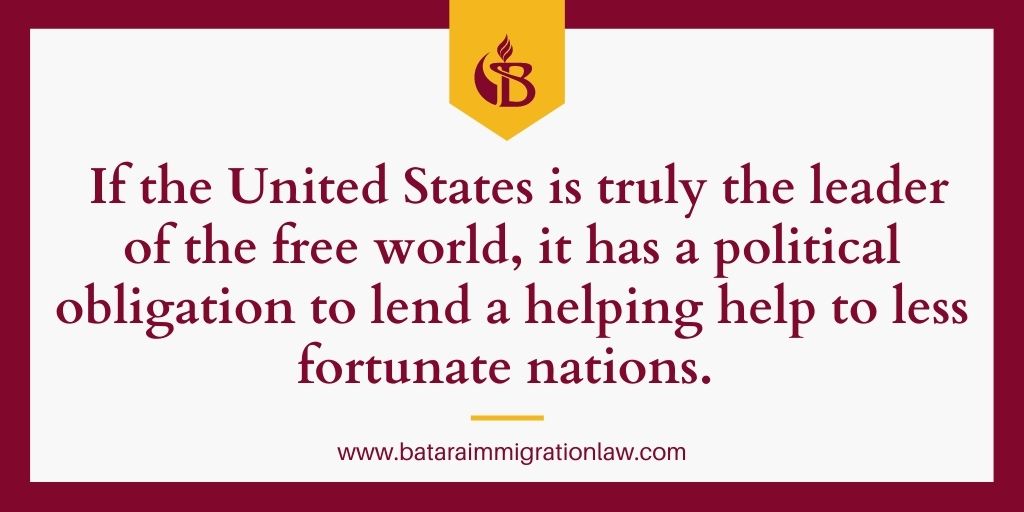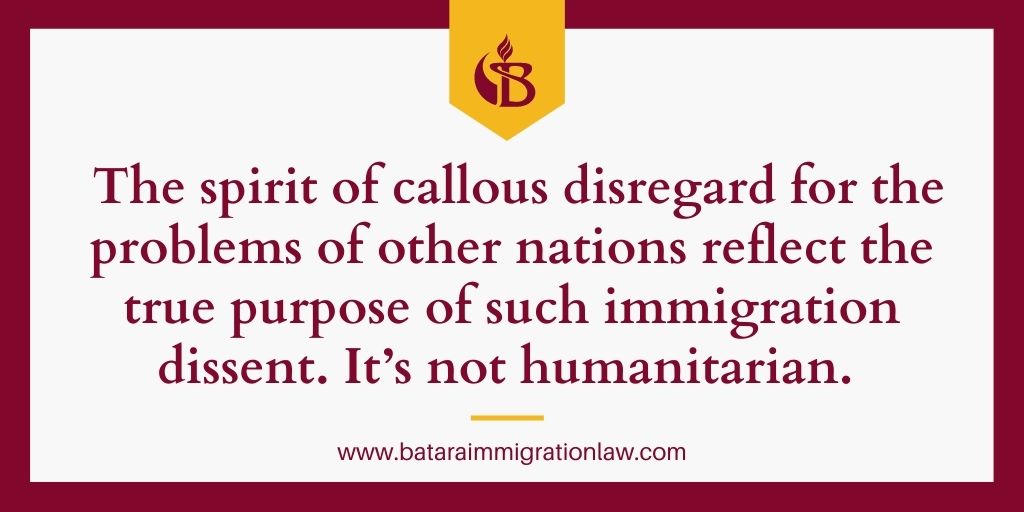
The fundamental premise behind Temporary Protected Status is quite simple.
If the United States is truly the leader of the free world, it has a political obligation to lend a helping help to less fortunate nations.
Especially in their moments of crisis.
Like Syrian citizens who have escaped from a brutal civil war in their home country.
DHS Announces Syria TPS Extension
Syria TPS Update
Registration Period For First Time Filers: August 1, 2022 – March 31, 2024
Re-Registration Period For Current TPS Grantees: August 1, 2022 – September 30, 2022
Current Expiration Date: March 31, 2024
On July 29, 2022, Secretary of Homeland Security Alejandro N. Mayorkas announced the extension and redesignation of Syria for Temporary Protected Status (TPS) for 18 months, through March 31, 2024.
This decision enables over 6,400 Syrians to continue working and living in the U.S.
It also allows nearly 1,000 first-time Syrian TPS applicants, who have lived in the United States since July 28, 2022, to apply for TPS protection and benefits.
Earlier, on January 29, 2021, the then-Acting DHS Secretary Pekoske announced an 18-month extension and re-designation of Syria’s Temporary Protected Status designation.
Pekoske’s announcement ended fears of Syrians residing in the U.S., sparked by the Trump Administration’s desire to end the TPS program, that they would be sent back to an unsafe environment in their home country.
The announcement noted that, in fact, the war conditions in Syria prevented their safe return:
“The Syrian civil war continues to demonstrate deliberate targeting of civilians, the use of chemical weapons and irregular warfare tactics, and use of child soldiers.”
Added DHS, “The war has also caused sustained need for humanitarian assistance, an increase in refugees and displaced people, food insecurity, limited access to water and medical care, and large-scale destruction of Syria’s infrastructure.”
Having listened to first-hand accounts of the country’s civll war, as a lawyer for Syrian TPS applicants, the Biden Administration’s 2021 and 2022 extensions are welcomed news.
These marked the seventh and eighth designation for Syrians, a country ravaged by brutal civil conflict and human atrocities.

Syria TPS Origins
The rationale for Syria TPS protections at the outset of the program remains the reason for its current extension.
On March 23, 2012, Department of Homeland Security Secretary Janet Napolitano announced that Syrians living in the U.S. would be allowed to apply for Temporary Protected Status (TPS).
The government announcement was based on the ongoing civil conflict and escalation of violence in Syria.
In her statement, Napolitano explained:
“Conditions in Syria have worsened to the point where Syrian nationals already in the United States would face serious threats to their personal safety if they were to return to their home country.”
Dr. Yahya Basha, Chairman of United for a Free Syria (UFS), added, “The TPS designation will protect thousands of Syrian nationals, who would have been otherwise obligated to endanger themselves and their families by returning to Syria.”
The brutality of the Syrian government is captured in For Sama, a first-hand documentary about the Syrian uprising and conflict filmed by Waad Al-Kateab.
History Of Syria TPS Extensions
First Syria TPS Designation:
The first registration period for Syrian TPS ran from March 29, 2012 through September 25, 2012.
Since all TPS designations have an 18-month limit, the program was set to end September 30, 2013. But on June 17, 2013, DHS granted a re-designation and extension of Temporary Protected Status because Syria’s civic problems had not been resolved.
Second Syria TPS Designation:
Under the original designation, Syrian refugees who arrived in the U.S. after March 29, 2012 were not allowed to seek Temporary Protected Status.
Under the 2013 re-designation, these immigrants were allowed to apply for TPS benefits and protection.
The re-designation allowed Syrians who had been living in the United States since June 17, 2013 to file initial, first-time applications for TPS.
The 2013 extension allowed TPS beneficiaries to retain their status up through March 31, 2015.
Third Syria TPS Designation:
Syrian TPS registration was opened again from January 5, 2015 to March 6, 2015, and TPS status was extended to September 30, 2016.
A few facts from the Federal Register and other government sources outlined the severity of conditions affecting Syrians:
As of 2015, it was estimated that over 6.3 million people within Syria, as well as 3 million Syrian refugees in neighboring countries are in need of emergency food assistance.
Water availability in Syria had decreased to less than 50 percent of its pre-civil war levels.
The United Nations Children’s Emergency Fund UNICEF) reported that in 2015 alone, as many as 5 million Syrian citizens had suffered the consequences of long and sometimes deliberate interruptions to their water supplies.
By November 2015, Syria’s civil war had caused over $270 billion in damages to the country’s infrastructure. An estimated 2.1 million homes, half of the country’s hospitals, and over 7,000 schools had been destroyed due to the conflict.
As of March 2016, the United Nations High Commissioner for Refugees (UNHCR) had registered 4.8 million refugees in neighboring countries, and 6.5 million people had been internally displaced in Syria.
Between 2011 and April 2016, strikes against population centers throughout Syria killed 738 medical personnel. 259 medical facilities had been indiscriminately or deliberately attacked.
These attacks, reported the U.N. Office of the High Commissioner for Human Rights (OHCHR), led to increases in miscarriages, birth defects, and infant mortality, as well as the inability to respond adequately to outbreaks of cholera, typhoid, scabies and tuberculosis.
In May 2016, the United Nations Special Envoy for Syria had estimated that as many as 400,000 individuals had been killed, and 1.5 million injured since the violence began in 2011.
The report also noted nearly 11.3 million Syrians had been displaced from their homes since the beginning of the Syrian conflict, with over 1.2 million estimated to have been displaced in 2015 alone.
In addition, according to the U.N. Office for the Coordination of Humanitarian Affairs, about 50 percent of displaced Syrians were children.
Furthermore, the U.N. explained, an estimated 4.6 million Syrians were living in over 127 hard-to-reach and 18 besieged locations within the country, and were not able to receive humanitarian assistance.
Fourth Syria TPS Designation:
On August 1, 2016, the U.S. government granted another extension, allowing Syrians to re-register for TPS valid through March 31, 2018.
Fifth Syria TPS Designation:
This was followed by another period of TPS re-registration between March 5, 2018 and May 4, 2018. Syria TPS was extended to September 30, 2019.
However, in the 2018 designation, the Trump Administration moved away from allowing Syrians to file first-time applications for TPS.
Syrians who came to the U.S. after August 2016 are were shut out of the TPS program — despite the ongoing war in Syria and against the urging of human rights activists and Syrian community leaders.
(In the January 2021 announcement, the Biden Administration reversed direction. Syrian nationals who entered the United States after August 1, 2016 were granted the right to register as first-time applicants for TPS.)
Sixth Syria TPS Designation:
A new extension was announced on August 1, 2019. The new re-registration period was set from September 23, 2019 until November 22, 2019.
The expiration date was scheduled for March 21, 2021.
Due to the animosity of the Trump Administration towards the TPS program, many Syrians feared the end of Syrian TPS was imminent.
The False Attack By Critics Of Syria TPS As De Facto Amnesty
Temporary Protected Status is not a new government program.
A special humanitarian immigration program, TPS was created in 1990.
Its purpose is to provide immigrants with a temporary safe harbor while they are not capable of returning safely to their country of origin due to environmental disasters, wars, or similarly severe conditions.
When the program is used by the U.S. government, it is used as part of broader relief efforts.
Although the current conditions in Syria fit within the purpose of temporary protected status policy, not all parties agreed on the grant of TPS to Syrians.
Led by the Center for Immigration Studies (CIS), a non-profit organization which supports immigration reduction, opponents asserted granting artificial benefits to Syrians was not the appropriate response to the emerging civil war in Syria.
Instead, CIS suggested the U.S. government should simply freeze the immigration status of all Syrians currently living in the U.S.
The CIS position is hardly surprising.
Mark Krikorian, the Center’s Director, has long argued Temporary Protected Status has given “hundreds of thousands of people” from various nations a sometimes decade-or-longer de facto amnesty as a result of civil strife, or a big wind, or an earthquake in their home country.
In a more recent criticism, CIS focused on the 2021 Syria extension, adding a new twist to its amnesty assertions. Since the term “redesignation” has no statutory basis, CIS claims the term means “new designation.” This means, they assert, new and different conditions should now exist in whatever country has been granted redesignated status.
However, such changes have not taken place in Syria. Rather, the Syrian redesignation reflects that the term “redesignation” is just a political tool to encourage immigrants from TPS countries to find a way into the U.S. so they, too, can received temporary legal status and work authorization.
Krikorian’s use of the word “amnesty” is misplaced.
Amnesty reflects an act of forgiveness for past transgressions – not an act of compassion for individuals mired in temporary human misery.
Similar misguided attitudes have led to the non-acceptance of Syrians in various U.S. communities.
The spirit of such callous disregard for the problems of other peoples reflects the true purpose of their dissent. It’s not humanitarian.

Why TPS Was Granted For Syria:
Horrors Of A Brutal Civil War
In early 2011, as part of a growing political awakening in the Middle East, Syrians began calling upon President Bshar al-Assad to institute democratic reforms.
Instead, crackdown by security forces in the city of Daraa, against school children who had written anti-regime slogans on walls, took place. Protests followed. Several protesters were killed and many others were severely injured.
Within the next 10 days, protests spread to cities across Syria.
Over 9,000 civilians were killed during the initial protests.
Thousands were physically injured, and thousands more were arbitrarily arrested and tortured while detained.
According to news reports, the uprising quickly evolved into a full blown insurgency, with daily battles between government troops and opposition forces.
Due to the worsening situation, on February 6, 2012, the U.S. closed its embassy in Damascus, the capital of Syria, and recalled its ambassador.
Turkey, which shares a border with Syria, set up temporary refugee camps for over 17,000 Syrians, who fled the violence in their home country. The numbers rapidly rose.
Since that initial period of country disruption, the amount of fleeing refugees have continued to grow, and accommodating Syrian refugees has become a major concern for various countries across the globe.
The Syrian TPS Community
In The United States
At the outset of Syrian TPS, the pool of potentially eligible Syrians was relatively small.
DHS estimated that only about 2,500 – 3,000 Syrians living in the United States would be eligible to apply for Temporary Protected Status.
Currently, It is estimated that nearly 7,000 Syrians are living in the United States with TPS status, allowing them to live and work legally while it remains unsafe for them to go back.
The January 2021 extension announcement stated another 1,800 Syrians are eligible to file initial applications to obtain such status.
TPS advocates, on the other hand, estimate that only about 50% of potentially eligible Syrians have applied to date.
Over time, some of those who qualify for Temporary Protected Status may opt to file for asylum due to the ongoing and escalated tensions in their home country.
However, Syrian community leaders concede there is a significant percentage of Syrians who are unlikely to apply for either TPS or asylum, based in part to distrust of the United States government.

Asylum For Syrian Civil War Victims?
The ongoing Syrian civil war has given way to a massive global displacement and refugee problem.
As part of a United Nations effort to help fleeing Syrians, the U.S. pledged to resettle 10,000 Syrian refugees in 2016. Thus far, the program has not met its goal.
Several states, led by Texas, strongly opposed placement inside their borders.
Accordingly, the re-designations of TPS for Syria has angered critics, as well as refugee resettlement critics, who claim it disregards the fears of U.S. citizens to Syrian refugee relocation efforts.
Many argue that Syrian fighters have trained with ISIS forces seeking ways to infiltrate the United States in order to conduct terrorist attacks.
In fact, there are more Syrians who have gained lawful entry to the United States through the resettlement process than Temporary Protected Status beneficiaries. This is no reason to terminate the TPS program in place for Syrians.
Most TPS beneficiaries, after all, were living in the U.S. at the time of the initial designation in 2012. It is unlikely these beneficiaries trained with ISIS, a relatively recent phenomenon, since they have been in the U.S. at least 4 – 5 years before that designation.
Rather, the contrary is true.
In my view, as a Riverside immigration attorney, some Syrians eligible for temporary TPS benefits may also qualify for more permanent immigration benefits, including residency, under asylum and refugee law.
Although there is a one year window to file an asylum claim upon arrival in the U.S., the law permits applications to be filed when there have been changed conditions in an immigrant’s country of origin.
The possibility of Syrian refugees seeking asylum is strengthened by disclosures like those about chemical weapons being used to cause massive civilian deaths.
Moreover, to the extent the new arrivals qualify as refugees due to Syria’s horrible circumstances, many TPS beneficiaries should likewise qualify as asylees.
Refugees and asylees are functional equivalents under asylum law, except the former applies for status from abroad, whereas the latter applies from inside the U.S.
To prove asylum eligibility, applicants need to show they cannot safely return to Syria due to a well-founded fear of persecution or harm related to their political opinion, nationality, religions, race, or membership in a particular social group.
Some examples:
- A Syrian citizen who, before arriving in the U.S., was an active member of organizations which actively opposed the current Syrian leadership
- A Syrian citizen living in the U.S., with family members living in Syria who have been killed, tortured, or imprisoned due to their opposition to the Syrian government
- A Syrian citizen who, during his or her residency in the U.S., has played an active role in protests and building opposition to the current Syrian government regime
Syrian TPS: A Humanitarian Imperative
Contrary to the dominant rhetoric of immigration politics, various aspects of immigration policy are based on humanitarian concerns.
In other words, the duty to help other countries, in their time of need, is more than a political issue. It’s part of our moral duty as the self-professed leader of the free world.
Providing TPS as well as asylum protections, when needed, is part of this duty.
By Carlos Batara, Immigration Law, Policy, And Politics




